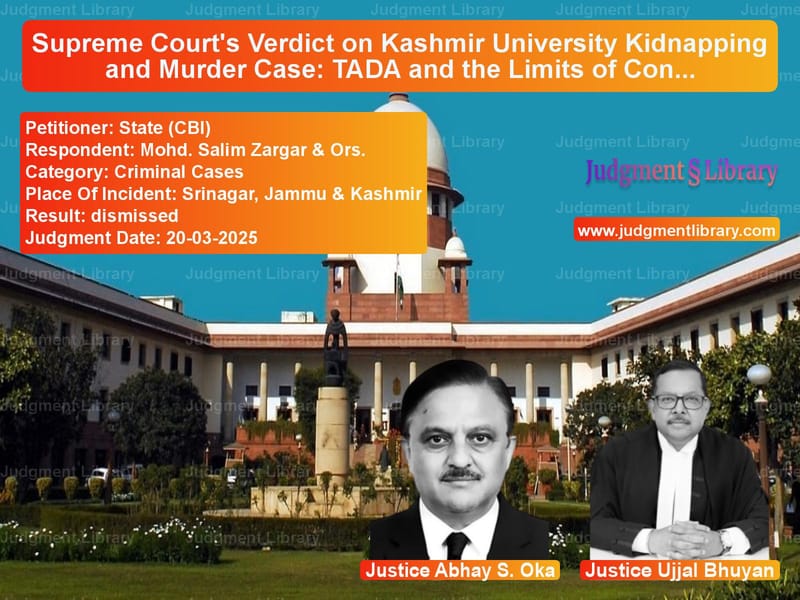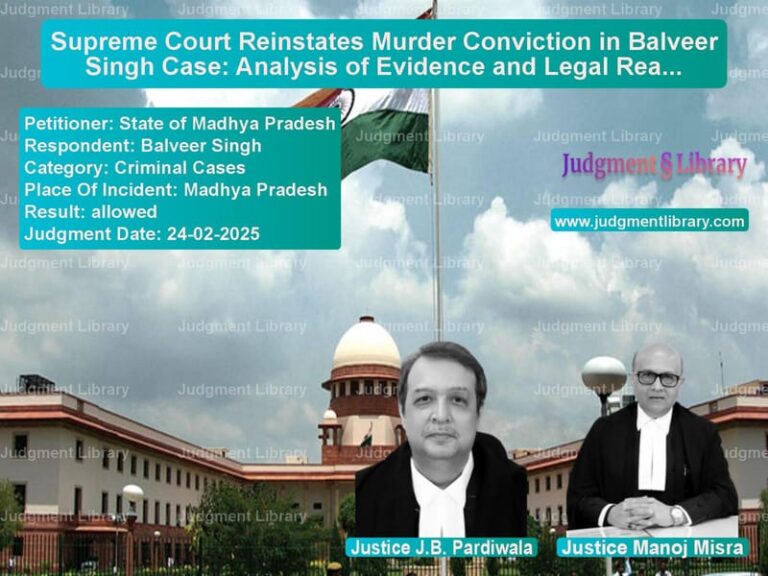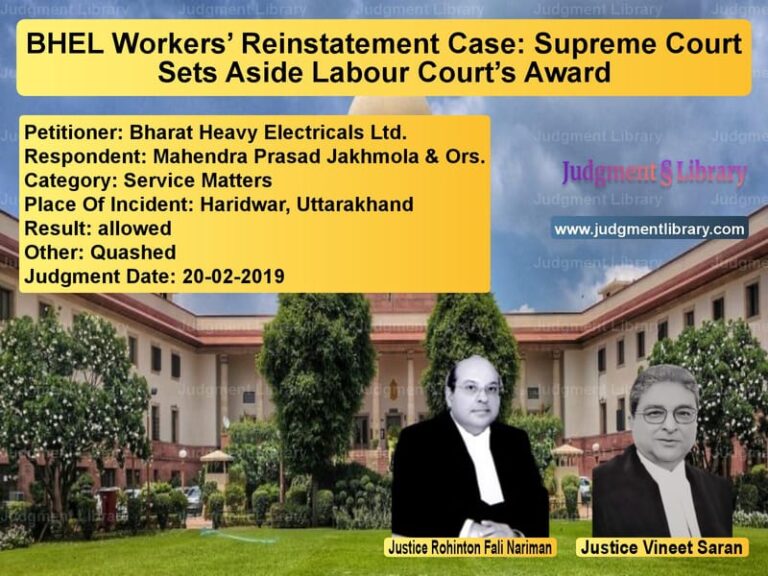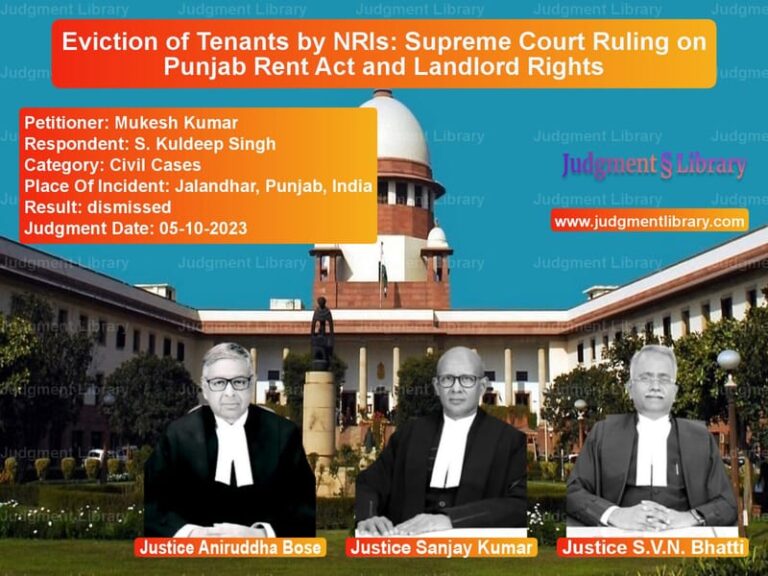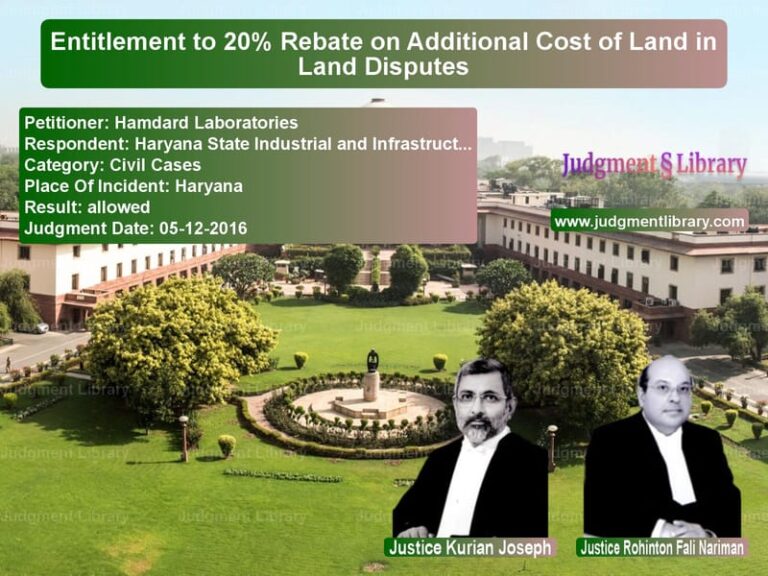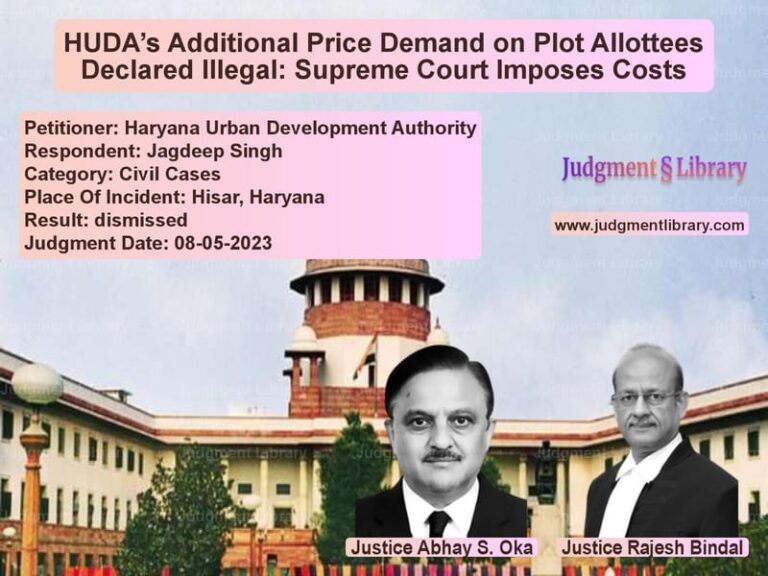Supreme Court’s Verdict on Kashmir University Kidnapping and Murder Case: TADA and the Limits of Confessional Statements
The case of State (CBI) vs. Mohd. Salim Zargar & Ors. is a landmark judgment that delves into the application of anti-terrorism laws, particularly the Terrorist and Disruptive Activities (Prevention) Act (TADA), and the legal admissibility of confessional statements obtained under duress. This case concerns the 1990 kidnapping and murder of Dr. Mushir-ul-Haq, the Vice-Chancellor of Kashmir University, and his Personal Secretary, Abdul Gani Zargar. The judgment is pivotal in defining procedural fairness in cases involving terrorism-related charges.
The Supreme Court’s verdict not only reaffirmed the principles of due process but also emphasized the necessity of corroborative evidence when relying on confessions obtained under TADA.
Background of the Case
The events leading up to this case began on April 6, 1990, when armed militants, later identified as members of the Jammu & Kashmir Students Liberation Front (JKSLF), abducted Dr. Mushir-ul-Haq and his secretary from the campus of Kashmir University. The abductors, seeking to pressure the government into releasing detained militants, demanded immediate compliance with their demands. However, when their conditions were not met, they brutally executed both hostages, and their bodies were discovered on April 10, 1990. The gruesome killings sent shockwaves across the nation, leading to a full-fledged CBI investigation.
Charges Against the Accused
The CBI, after an extensive investigation, arrested multiple suspects, charging them under:
- Sections 302 (murder), 364A (kidnapping for ransom), and 120B (criminal conspiracy) of the Ranbir Penal Code (RPC).
- Various provisions under TADA and the Arms Act.
The Special Court handling TADA cases took cognizance of the matter, and trials began in the late 1990s.
Petitioner’s Arguments
The CBI, as the petitioner, argued that the confessional statements recorded by the police under TADA should be treated as conclusive evidence of guilt. The prosecution, led by Mrs. Sonia Mathur, presented the following arguments:
- The accused had given voluntary confessional statements before high-ranking police officers, which should be admissible under Section 15 of TADA.
- Past precedents, including Kartar Singh vs. State of Punjab (1994), upheld the admissibility of confessions recorded under TADA.
- There was corroborative evidence in the form of recovery of arms from the locations disclosed by the accused.
- The gruesome nature of the crime justified the invocation of TADA, and leniency in procedural technicalities should not be extended.
During the hearings, Mrs. Mathur passionately argued:
“Terrorism cases cannot be treated like ordinary criminal cases. The law provides for special treatment, including accepting confessions made to police officers. The gravity of the offense necessitates strict legal interpretations.”
Respondent’s Arguments
The defense, led by senior advocate Ms. Kamini Jaiswal, strongly opposed the prosecution’s reliance on the confessions. The respondents contended that:
- The confessions were obtained under duress at locations such as BSF camps, which inherently created coercive environments.
- The accused were not provided legal representation at the time of recording their statements.
- The prosecution failed to present independent evidence linking the accused to the crime.
- Several witnesses who had initially testified against the accused later retracted their statements, citing coercion.
Ms. Jaiswal argued before the Court:
“The law is clear—confessions extracted under coercion cannot form the sole basis for conviction. If the prosecution cannot provide independent corroboration, the court must give the benefit of doubt to the accused.”
Supreme Court’s Observations
The Supreme Court, led by Justices Abhay S. Oka and Ujjal Bhuyan, scrutinized the confessions and procedural irregularities. The Court made the following key observations:
“A confession must be recorded in an atmosphere free from fear. Statements obtained at highly guarded facilities like BSF camps fail this fundamental test.”
“The burden lies on the prosecution to prove that the accused confessed voluntarily. A confession recorded in custodial settings where legal aid is absent casts serious doubts on its reliability.”
“The Special Court was correct in dismissing these confessions as unreliable. The prosecution’s failure to provide corroborative evidence makes it unsafe to convict the accused.”
The bench further noted that under Article 21 of the Constitution, the right to a fair trial includes protection from coerced confessions.
Legal Precedents Cited
The Supreme Court referenced several landmark judgments in its analysis:
- Kartar Singh vs. State of Punjab (1994) – Clarified the procedural safeguards under TADA.
- Selvi vs. State of Karnataka (2010) – Ruled that forced confessions violate fundamental rights.
- State of NCT of Delhi vs. Navjot Sandhu (2005) – Emphasized the need for corroborative evidence in terror cases.
Final Judgment
After extensive deliberations, the Supreme Court upheld the Special Court’s decision and dismissed the CBI’s appeal. The Court ruled that the accused could not be convicted solely on the basis of confessions recorded under questionable circumstances.
Delivering the verdict, Justice Oka stated:
“Extraordinary laws like TADA demand extraordinary caution in their application. Confessions obtained under duress and without procedural safeguards cannot sustain a conviction.”
The Court directed that all accused be acquitted due to lack of sufficient evidence.
Impact of the Judgment
This judgment reinforces the need for:
- Strict adherence to due process, even in terrorism-related cases.
- Ensuring legal representation during confession recordings.
- Corroborative evidence beyond just confessional statements.
The ruling serves as a reminder that procedural fairness is essential, even in cases concerning national security.
Petitioner Name: State (CBI).Respondent Name: Mohd. Salim Zargar & Ors..Judgment By: Justice Abhay S. Oka, Justice Ujjal Bhuyan.Place Of Incident: Srinagar, Jammu & Kashmir.Judgment Date: 20-03-2025.
Don’t miss out on the full details! Download the complete judgment in PDF format below and gain valuable insights instantly!
Download Judgment: state-(cbi)-vs-mohd.-salim-zargar-&-supreme-court-of-india-judgment-dated-20-03-2025.pdf
Directly Download Judgment: Directly download this Judgment
See all petitions in Terrorist Activities
See all petitions in Murder Cases
See all petitions in Attempt to Murder Cases
See all petitions in Judgment by Abhay S. Oka
See all petitions in Judgment by Ujjal Bhuyan
See all petitions in dismissed
See all petitions in supreme court of India judgments March 2025
See all petitions in 2025 judgments
See all posts in Criminal Cases Category
See all allowed petitions in Criminal Cases Category
See all Dismissed petitions in Criminal Cases Category
See all partially allowed petitions in Criminal Cases Category

